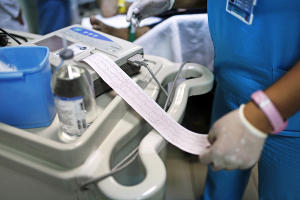por
John R. Fischer, Senior Reporter | August 28, 2019

Applying AI to EKG data could reveal a person's
overall health status
A new study says assessing electrocardiograms with AI may one day enable clinicians to measure the overall health status of patients.
Researchers at Mayo Clinic hypothesize that when applied to EKG data, AI can determine a patient’s gender and estimate their physiologic age, a measure of overall body function and health status distinct from chronological age.
“Being able to more accurately assess overall health status may help doctors determine which patients they should examine further to determine if there are asymptomatic or currently silent diseases that could benefit from early diagnosis and intervention,” said study author Suraj Kapa, assistant professor of medicine and director for Augmented and Virtual Reality Innovation at Mayo Clinic, in a statement. “For people at large, an AI-enhanced electrocardiogram could better show there may be something going on, such as a new health issue or comorbid condition that they were otherwise unaware of.”




Ad Statistics
Times Displayed: 28738
Times Visited: 681 Stay up to date with the latest training to fix, troubleshoot, and maintain your critical care devices. GE HealthCare offers multiple training formats to empower teams and expand knowledge, saving you time and money
Kapa and her colleagues utilized a convolutional neural network trained on the EKG data of almost 500,000 patients to find similarities among input and output data. Applying it to assess the data of 275,000 other patients, the system was able to predict the outcomes based only on input data.
Those who experienced adverse health events such as heart attacks or low ejection fraction had higher estimated chronological ages, while those who had few or no adverse events had lower ages. The system accurately determined the chronological age group of a patient with 72 percent accuracy and gender with 90 percent accuracy.
“This evidence — that we might be gleaning some sort of ‘physiologic age’ — was certainly both surprising and exciting for its potential role in future outcomes research, and may foster a new area of science where we seek to better understand the biologic underpinnings of such a finding,” said Kapa.
All participants were patients, and the EKGs were administered for another clinical indication. Further studies with an overtly healthy population are required to revalidate the neural network’s efficiency. In addition, gender was self-identified by patients and may not reflect the sex of all individuals in the study.
The findings were published in the journal,
Circulation: Arrhythmia and Electrophysiology.

